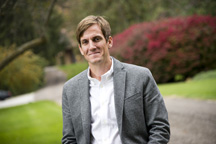Purdue anthropologist selected for 2015 Race Across USA to combine 3,000-mile run with research
October 31, 2013
 |
|
Bryce Carlson, a Purdue University assistant professor of anthropology, who studies primate ecology and nutrition in human evolution, is one of 10 runners selected for the 2015 Race Across USA. Carlson also will lead the event's various research projects, including evaluation of a program designed to promote childhood activity as well as the biological and behavioral responses to extreme physical activity. (Purdue University photo/Mark Simons) |
WEST LAFAYETTE, Ind. — A Purdue University anthropologist who studies primate ecology and nutrition in human evolution is one of 10 runners selected for the 2015 Race Across USA, and he also will lead the event's various research projects including evaluation of a program designed to promote childhood activity as well as the biological and behavioral responses to extreme physical activity.
Bryce Carlson has been named research director for the event, which is sponsored by the 100 Mile Club program. Starting in Huntington Beach, Calif., on Jan. 16, 2015, the 10 runners will run 26.2 miles per day from California to Maryland. The entire journey is about 3,000 miles or the equivalent of running 115 marathons. The race will cover 140 days, and the runners will have days off for muscle recovery and to visit area schools to promote the 100 Mile Club program. The goal of Race Across USA is to raise money and awareness for childhood activity and encourage schools to sign up for the 100 Mile Club program, which supports opportunities to run or walk 100 miles at school each year.
"The Race Across USA is an incredible and rare research opportunity to study how a group of athletes cope with the cumulative stress of long distance running," said Carlson, an assistant professor of anthropology. "As an anthropologist and runner, I'm absolutely over the moon about getting to participate in such an epic adventure that simultaneously contributes to our understanding of human biology, biocultural adaptation and the power of the human spirit."
Carlson will coordinate data collection and the various research teams participating in the 2015 event. The research program is in development and will be influenced by funding sources and collaborating scientists from Purdue and other universities. At this time the research objectives include studying childhood activity and the effectiveness of the 100 Mile Club program; sports medicine topics, such as the impact on runners' joints, and other health risks associated with the cumulative stress of high mileage running; as well as a number of biological and behavioral adaptations over the course of the event including running biomechanics, muscular adaptation, energetics and body composition changes, nutrition, social and psychological coping mechanisms, and strategies for rest and recovery.
Carlson, who specifically studies the dietary environment of wild chimpanzees and mountain gorillas, will be on leave from the Department of Anthropology during the spring semester 2015. He is a member of Purdue's Ingestive Behavior Research Center.
Participants will run in California, Arizona, New Mexico, Texas, Louisiana, Arkansas, Mississippi, Alabama, Georgia, South Carolina, North Carolina, Virginia and Maryland. They also will stop at the White House in Washington, D.C., on day 139 of the 140-day event.
Carlson, who applied for a runner's slot for Race Across USA, recently placed fourth in the Midwest Grand Slam of Ultrarunning, which is composed of four 100-mile trail races.
Writer: Amy Patterson Neubert, 765-494-9723, apatterson@purdue.edu
Source: Bryce Carlson, bryce@purdue.edu
Related websites:

